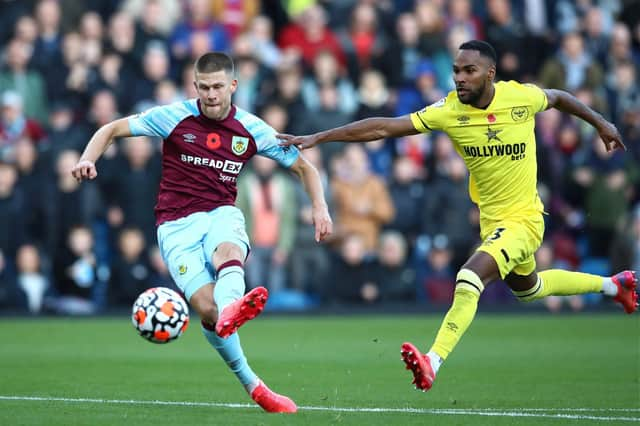“Don’t ruin it, we play 4-4-2!“ - Sean Dyche on a change of attacking emphasis


For England, you could largely insert Burnley during Sean Dyche’s nine years in charge.
There have been long spells of playing in a 4-4-1-1, particularly in finishing seventh in 2017/18, with Jeff Hendrick off the front, while there was an aborted attempt to shore things up the following season, with three centre backs deployed in three-successive defeats, and since abandoned.
Advertisement
Hide AdAdvertisement
Hide AdBut while the Clarets have come to be recognised as having the most consistent tactical approach in the Premier League, the arrival of Maxwel Cornet has allowed Dyche to shake things up somewhat.
At Manchester City, Burnley went from 4-4-1-1, with Cornet off Chris Wood, to 4-5-1, to 4-4-2.
But while the Clarets used three central midfielders both at City, and then at Southampton, Dyche went with two against Brentford, with Cornet, Dwight McNeil and Johann Berg Gudmundsson granted the freedom to affect the game behind Wood.
McNeil was involved in all three goals in the 3-1 win, Cornet scored one, had one ruled out and had a hand in the second, while Gudmundsson could have had a couple on another day.
Advertisement
Hide AdAdvertisement
Hide AdIt was effectively a 4-2-3-1, with the forward-thinking players showing great fluidity to hurt Brentford, killing the game by half-time.
Dyche explained the thinking: “We’ve not been trying not to do that, trust me, I think the way the opposition operate sometimes, different spaces to capitalise on…the way we perform generally, the eyes are alive, and as I said to the players, they’d not been far away from that anyway, but there was an extra edge against Brentford.
“Goals change games, I’ve always said it, not just literally, but in the feel of a performance, and then the consistency of it, because second half we didn’t quite find the same level.
“There was a bit of nervousness as well, the first win etc, you’re in a comfortable position so let’s not do anything silly - I understand that.
“But now it’s about ‘can you perform like that more often?’
Advertisement
Hide AdAdvertisement
Hide Ad“‘Can you keep the consistency of that performance throughout the 90 minutes?’
“These are all the challenges of football, and I think we continue to look at that, working hard to try and find those ways of operating with a bit of freedom.
“Still that framework to go to that has made us strong over the years, but that little bit of freedom to attack.
“You’ve got to work on transition anyway, because the modern game suggests you have to, and then the consistency within a performance, to maintain it.”
Advertisement
Hide AdAdvertisement
Hide AdAsked about the switch, Dyche laughed: “Don’t ruin it, we play 4-4-2!
“You can’t possibly think anything other…don’t make out we can be flexible!
“I’ve said it all along, apart from a 3-5-2/3-4-3, it’s about yardages.
“4-2-3-1, 4-4-1-1, it’s about people getting in higher positions, but the margins tactically are often defined by the players.
Advertisement
Hide AdAdvertisement
Hide Ad“The best example, in their pomp, was Man United, they played 4-4-2 every week, but if you watched them, you’d never think they were.
“I’ve spoken to Sir Alex Ferguson, their basic set up was a 4-4-2.
“They flexed it later on, but for a big chunk of the years where they were incredibly successful, it was a 4-4-2.
“The difference was they had players who came off that shape, to be creative, so you weren’t looking at it thinking it was a 4-4-2, but when they reverted back to shape, often it was 4-4-2/4-4-1-1.
“That was kind of the base position to go from.
Advertisement
Hide AdAdvertisement
Hide Ad“There was flexibility within that, but it’s mainly yardages in tactical awareness, and our players used the different yardages to their advantage.”
While Cornet has dominated the headlines, McNeil has flourished since his arrival, with the responsibility for being the team’s creative hub shared around more.
Dyche feels there is room for more growth, but is delighted with his form: “He’s learning to read the game better, in an attacking format.
“I spoke to him recently about it, opening his mind to breaking their back line, because he comes short so well and is so comfortable with the ball, sometimes he comes too short and you’ve got to beat seven players.
Advertisement
Hide AdAdvertisement
Hide Ad“If you break the first line, you’re onto the back four, and if you break the back line, you’re in behind and can affect the game.
“I think he’s working on that, floating away from the shape, as he did well against Brentford, coming inside into the pockets.
“These are the things we’re continually talking about and expressing for him to do, and when you’re on a good day, and he certainly was, and has been generally this season, then I think he can develop his game like that.
“We can help him with it, but his game knowledge will help that as well.
Advertisement
Hide AdAdvertisement
Hide Ad“Johann did it well as well, Maxwel seems to have a more natural understanding of it, when to go into those gaps, but equally he’s got to find the right balance defensively, because the Premier League is different and you have to work both ways.
“They definitely have that flexibility in their games to see the picture and different pockets and expose the opposition when they can.“